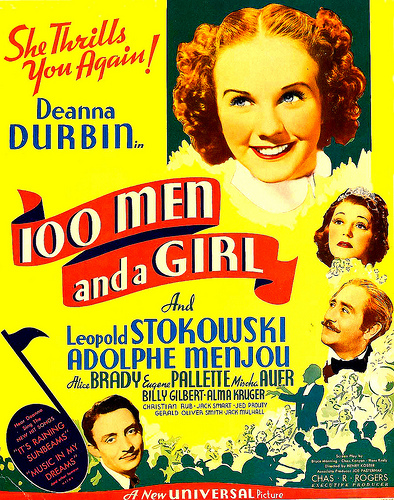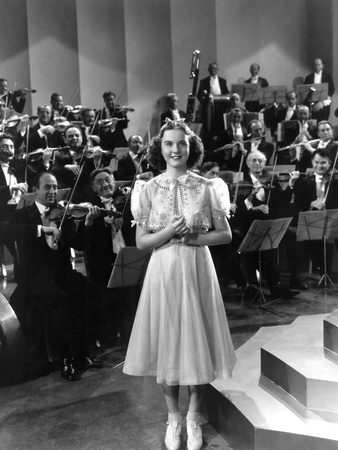100 Men and a Girl (aka One Hundred Men and a Girl) is child star Deanna Durbin’s most commercially popular and best known film.
Grade: B (*** out of *****)

Durbin, Universal Studio’s most bankable star during the Depression era, plays the daughter of a poor, unemployed violinist (Adolph Menjou) whose friends are also out of work.
In due time, the resourceful Durbin solves everything: She maneuvers 100 unemployed musicians, led by herself, into an encounter with music conductor Leopold Stokowski (played by himself).
 Their performance of Liszt’s “Second Hungarian Rhapsody” wins him over and he becomes their conductor.
Their performance of Liszt’s “Second Hungarian Rhapsody” wins him over and he becomes their conductor.
The concert is a big success, and Patsy, called upon to make a speech, instead sings the “Brindisi” (Drinking Song) from Verdi’s opera “La Traviata.”
The movie features music and songs that were especially written for Durbin, who carried the entire movie on her shoulders, proving that she was both a good singer and a good actress.

Oscar Nominations: 5
Best Picture: produced by Charles R. Rogers and Joe Pasternak
Original Story: Hans Kraly
Sound Recording: Homer G. Tasker
Film Editing: Bernard W. Burton
Score: Charles Previn

Oscar Awards: 1
Score
Note:
If you want to know more about the Oscars, please read my book:
Oscar Context
In 1937, nine other movies competed with “One Hundred Men and a Girl” for the Best Picture, including Warner biopic “The Life of Emile Zola,” which won the top award, Leo McCarey’s marital comedy “The Awful Truth” with six nominations, and Gregory La Cava’s backstage drama, “Stage Door,” with four.
The other nominees were: William Wyler’s social drama set in a New York City slum “Dead End,” the Pearl Buck literary adaptation “The Good Earth,” Frank Capra’s utopian comedy “Lost Horizon,” Henry King’s adventure “In Old Chicago,” and the first version of “A Star Is Born.”
Next to “Life of Emile Zola,” the most-nominated films were Fox’s adventure “In Old Chicago” and “A Star Is Born.” Only one of the ten nominated pictures was a comedy, Leo McCarey’s sublime screwball, “The Awful Truth,” co-starring Cary Grant and Irene Dunne at their very best.
The Oscars were spread among eight films; the only two pictures that didn’t win any award were “Dead End” and “Stage Door.” The Original Story Oscar was won by William A. Wellman and Robert Carson for “A Star Is Born,” the Sound Award by Thomas Moulton for “The Hurricane,” and Film Editing by Gene Havlic and Gene Milford for “Lost Horizon.”
Cast
Deanna Durbin as Patricia “Patsy” Cardwell
Adolphe Menjou as John Cardwell
Leopold Stokowski portraying himself
Eugene Pallette as Mr. John R. Frost, the sponsor of the “One Hundred Men”
Alice Brady Frost’s wife
Alma Kruger as Mrs. Tyler, Cardwell’s landlady
Mischa Auer as Michael Borodoff, a flautist and one of Cardwell’s neighbors
Billy Gilbert as the owner of the garage where the “One Hundred Men” rehearse
Jed Prouty as Tommy Bitters, a man engaged in pranks with John R. Frost.
Jack Smart as Marshall, Stokowski’s doorkeeper
Frank Jenks as a taxi driver who keeps a running tab for Patsy, his “investment” in her singing voice
Gerald Oliver Smith As Stevens, the butler




